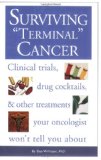Describes how to use the Web and other sources to understand about experimental drug trials, effective types of option medicine, and other breakthroughs with the possible for drastically enhancing the odds of successful treatment.
List Price tag: $ 21.95
Price: [wpramaprice asin=”1577491165″]


Leave a Reply
You must be logged in to post a comment.